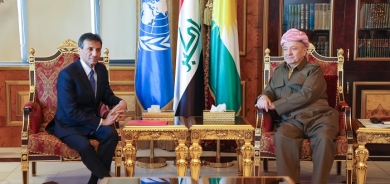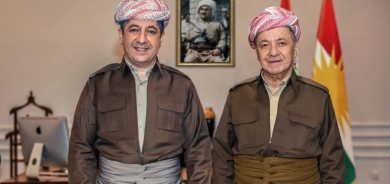Syria: The Battleground between Sunnis and Shittes

In a late 2011 article, I argued that Syria’s upheaval thrusts Turkey and Iran into a collision course because they have opposing geostrategic interests in an outcome that neither party can afford to ignore. Four months later, it has become increasingly clear that the Syrian uprising transcends Iran’s and Turkey’s strategic interests, as it has become the battleground between the Sunni and Shiite communities throughout the Middle East. The Syrian uprising has drawn a clear sectarian line: the Sunni axis led by Turkey and Saudi Arabia and the Shiite axis led by Iran. The new political order that will eventually emerge in Syria will determine not only the ultimate success or failure of Iran’s aspiration to become the region’s hegemon but whether or not the Sunni Arab world will maintain its dominance. Hence, the conflict will be long, costly and bloody, reflecting the troubled history between the two sides that has extended over a millennium.
History may not repeat itself but it remains instructive. The Sunni-Shiite schism goes back more than a thousand years, starting with the dispute over the Islamic Caliphate following the death of Prophet Muhammad in 632 and carrying through to the conflict between the Shiite Safavid dynasty in Persia and the Sunni Ottoman dynasty in Turkey in the 16th and 17th centuries. This conflict has, in fact, shaped the geography of Shiite Islam to this day: Persia and its periphery are Shiite and Sunnis are located to its East and West. There were periods of conflict and periods of peace, such as the epoch that existed between the collapse of the Ottoman Empire and the rise of the secular Pahlavi dynasty in Iran in the 1920s. This period was broken by Iran’s Islamic revolution in 1979, whose vigorous attempt to export the revolution to its Sunni Arab neighbors and the latter’s fierce resistance manifested in the eight-year-long Iran-Iraq war in the 1980s. Given this enduring rivalry, the superficial political effort made by Turkey and Saudi Arabia to obscure the conflict between the Sunni and Shiites has now been thrown into the spotlight for all to see.
There is no greater evidence of the intense conflict between the Sunnis and the Shiites than the violent clash in Bahrain where Saudi Arabia directly interfered militarily to quell the Shiite uprising to ensure continued Sunni dominance. However small Bahrain is, it represents a microcosm of the Sunni-Shiite conflict that has engulfed the region. The Sunni insurgency in Iraq continues to terrorize the Shiite majority, resulting in a weekly death of dozens of innocent civilians on both sides. The Shiite’s Hezbollah group in Lebanon continues to support the Syrian government’s violent crackdown on its citizens, killing by most estimates more than 10,000. Sunni Hamas, which has enjoyed financial and military support from Iran while simultaneously receiving political and logistical support from the Syrian Alawite regime (an offshoot of Shiite Islam), has left its headquarters in Damascus and now openly condemns the Syrian Authority’s bloodletting against its Sunni population.
Diplomatic tension rose last week between Ankara and Tehran over statements from Iranian officials about moving the nuclear talks to a more “neutral territory” such as Syria, Iraq or China, resulting in an angered Turkish Prime Minister Recep Tayyip Erdogan who bluntly criticized the Iranians’ “lack of honesty.” A dichotomy on Syria exists between Iran and Turkey: whereas the former supports the Assad regime with everything he needs, the latter hosts the main opposition body, the Syrian National Council (SNC). This is a reflection of their individual national interests to dominate a country that provides both of them an opportunity to assert themselves as the region’s hegemon and attempt to offer a model to the newly-emerging Arab regime to emulate. Above all else, however, the Sunni Islamic movement, just as the ruling Justice and Development Party (AK Party), adamantly opposes a Shiite dominance in its neighborhood.
At greater stake in Syria is the national interest of Saudi Arabia as the conservative leader of the Arab Sunni world. A consolidation of Iran’s grip over Syria would transcend the Shiite influence over the entire crescent of landmass between the Persian Gulf and the Mediterranean. Though Saudi Arabia paid not much heed to Saddam Hussein’s ultimate fate (who once threatened to invade the kingdom), handing Iraq to Shiite Iran on a golden platter in the wake of the Iraq war of 2003 was, and remains, deeply troubling to Riyadh. The fact that Iraq is ruled by a Shiite regime closely allied with Tehran explains why Saudi Arabia has provided refuge to Iraq’s top Sunni political figure, Vice President Tariq al-Hashimi, whose political conflict with the Shiite Prime Minister al-Maliki resulted in him being sought by Iraqi authorities on terrorism charges. It is critical for Saudi Arabia to pull Syria out of Iran’s belly, which explains why the Saudi government is supportive of arming the rebels in Syria in the hope of toppling the Assad regime.
Moreover, there is no love lost between Iran and the Sunni Muslim Brotherhood (MB) – a regional Islamic Sunni movement whose local parties will certainly form the new regimes in Egypt, Libya, and Tunisia. Although all three countries are undergoing a difficult transitional process, they would cheer the collapse of the Assad regime and would do whatever they could to support the emergence of a Sunni government in Syria. The new transitional governments in Libya as well as Tunisia recognize the SNC as the legitimate authority of Syria. Similarly, the turmoil in Egypt did not prevent the MB from clearly indicating that they simply do not see eye to eye with Iran. In fact, the chairman of the Foreign Affairs committee in the Egyptian parliament, the MB Freedom and Justice Party member Dr. Essam al-Arian, stated ominously that the Arab Spring would also reach Iran.
As international sanctions began to bite and the Iranian leadership began to feel the pain, they agreed to re-engage in negotiations with the P5+1 over their nuclear program. Equally motivating to Tehran, however, is the situation in Syria. The deteriorating conditions of Syria and Iran’s nuclear issue have become intertwined because the Iranian pursuit of nuclear weapons is driven not merely by national security considerations but essentially by Tehran’s desire to secure nuclear weapons to bolster its regional hegemony. Assad’s Syria is key to this strategy, and its fall would further increase Iran's isolation in a mostly-Sunni neighborhood and cut the direct links between Tehran and its Hezbollah ally in Lebanon. Also, once Assad’s Syria is unraveled, the current substantial Iranian influence on Iraqi politics would weaken at a much quicker pace. Indeed, it is more than likely that Iraqi nationalism would eventually trump its internal Sunni-Shiite divide as Iraq historically takes pride in its unique place in Arab culture as the cradle of Arab civilization.
It follows that Iran may well be willing to demonstrate some flexibility in the Istanbul talks on the nuclear issue by using its Russian patrons to convince the West to curb the pressure on Syria to save the Assad regime, and buying time to prevent an attack on their nuclear facilities by Israel and/or the US. From the Iranian perspective they can always resume the nuclear program at a later date once the Assad regime is re-stabilized and in so doing, can safeguard the Shiite crescent. One can only hope that the West would not fall for the manipulative mastery of the Iranians. Note that the sacrifice of a temporary pause in the nuclear program in return for higher political purpose was also tried successfully by Tehran in 2003.
In the wake of the imminent collapse of the Kofi Anan plan to end the conflict in Syria the leading Sunni countries, Turkey and Saudi Arabia, now have the opportunity and the obligation to bring an end to the Assad regime, end the massacre and pave the way for the emergence of a Sunni government in Damascus. To achieve that, both nations (deriving their legitimacy from the Arab League) must provide military assistance to the rebels while Turkey should carve a significant landmass along its border and along with its NATO allies, enforce a no-fly zone to protect the Syrian refugees and the Free Syrian Army. Moreover, both nations should make every effort to enlist the international community to bestow legitimacy on the SNC to provide the foundation for a transitional government. Such an effort will save Syria as well as the national interest of the Sunni states in the region while depriving Iran of its aspiration to become a regional hegemon potentially equipped with nuclear weapons.
Anything short of that would mean handing Iran a complete victory and surrendering the Middle East to an inevitable, but wider, violent conflict in the future between the two axes of Sunnis and Shiites.

 Alon Ben-Meir
Alon Ben-Meir







